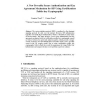273 search results - page 7 / 55 » Modular Security Proofs for Key Agreement Protocols |
CIS
2007
Springer
14 years 1 months ago
2007
Springer
The session initiation protocol (SIP) is considered as the dominant signaling protocol for calls over the internet. However, SIP authentication typically uses HTTP digest authentic...
ACNS
2004
Springer
14 years 27 days ago
2004
Springer
A family of authenticators based on static shared keys is identified and proven secure. The authenticators can be used in a variety of settings, including identity-based ones. App...
CRYPTO
2006
Springer
13 years 11 months ago
2006
Springer
In a seminal paper, Feldman and Micali (STOC '88) show an n-party Byzantine agreement protocol tolerating t < n/3 malicious parties that runs in expected constant rounds. H...
CRYPTO
2003
Springer
14 years 21 days ago
2003
Springer
We consider the fundamental problem of authenticated group key exchange among n parties within a larger and insecure public network. A number of solutions to this problem have bee...
COMPSEC
2006
13 years 7 months ago
2006
Anonymity is a desirable security feature in addition to providing user identification and key agreement during a user's login process. Recently, Yang et al., proposed an eff...

